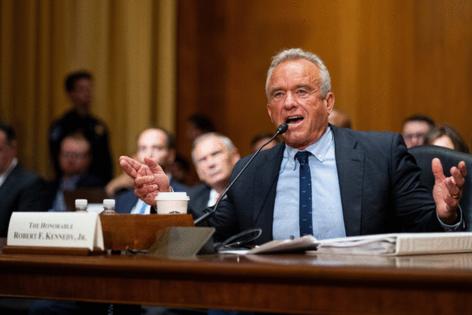Kennedy commission child health report ignores gun violence, the leading cause of child death
Published in News & Features
The Make America Healthy Again Commission, led by Robert F. Kennedy Jr., has released its Make Our Children Healthy Again Strategy, a 20-page report the U.S. Department of Health and Human Services described as a “sweeping plan” to “reverse the failed policies that fueled America’s childhood chronic disease epidemic.”
In a meeting livestreamed Tuesday from the department’s headquarters, MAHA commission members ticked through ways the U.S. will tackle poor diet, chemical exposures, excess prescription medications and the toxic combination of too much stress and too little physical activity — the four primary threats to child health the commission identified in May.
Absent from the document was any mention of guns, the leading cause of death for people under the age of 18.
Firearms have been the leading cause of death for children ages 1 to 17 every year since 2022.
More than 2,500 kids died from gunshot wounds in 2022, the last year for which complete data is available, and guns were responsible for 30% of all deaths of 15- to 17-year-olds, the Johns Hopkins Center for Gun Violence Solutions found after analyzing data from the Centers for Disease Control and Prevention.
Guns’ absence from the MAHA strategy raised alarm among pediatricians and public health experts.
“If you’re putting out a report that’s supposed to address how to help our children stay healthier, and you’re not even mentioning the No. 1 cause of childhood deaths, you ought to be embarrassed,” said Bruce Mirken, a spokesperson for Defend Public Health, a volunteer coalition of scientists, healthcare workers and other public health professionals launched this year to push back on disinformation and funding cuts.
The short document described more than 120 topics that the administration plans to tackle with little more than a brief paragraph each for subjects as varied as water quality, ultraprocessed foods and fluoride.
“It lacks details on how the Administration plans to address those issues and omits key drivers that harm children’s health, including gun violence and environmental hazards,” the American Academy of Pediatrics said in a statement Tuesday. “We know that to make children healthy and help them thrive, they need safe, stable and nurturing families, communities, relationships and environments.”
When asked at Tuesday’s meeting whether the commission considered the role of firearms, Kennedy replied that his agencies would focus instead on the reasons young people were reaching for guns.
“The violence is what we’re concerned with,” Kennedy said, “this sudden onset of violence that began in the 1990s ... [where] someone walks into a school or church or theater and starts shooting strangers.”
Kennedy said the U.S. National Institutes of Health will soon launch studies into some potential causes of this violence, including the use of psychiatric drugs, video games and social media.
The particularly American phenomenon of mass shootings — incidents in which one or more shooters target multiple victims in public places — has risen sharply since the late 1980s, according to data from the Rockefeller Institute of Government, an Albany, N.Y.-based think tank.
Previous research on links between psychiatric drug use and mass shootings has failed to turn up evidence of causation. Kennedy has spoken frequently of his suspicion that prescribed antidepressants trigger violence in their users, most recently after last month’s shooting at Annunciation Catholic School in Minneapolis.
“You could find a correlation between use of psychiatric drugs and violence, but that’s because the people taking these drugs have depression and other mental health issues,” Mirken said. He pointed to a study published earlier this year in JAMA Pediatrics that found thousands of additional child gun deaths in U.S. states with more permissive gun laws.
Kennedy did not disclose any further details on the studies Tuesday. The Trump administration has significantly slashed funding to gun violence prevention research and programs this year.
“This attitude fits in with the way that HHS under Kennedy approaches most health problems — by focusing on preconceived notions and conspiracy theories rather than on actual health threats,” said Dr. Adam Ratner, a New York pediatric infectious-disease specialist and author of the book “Booster Shots: The Urgent Lessons of Measles and the Uncertain Future of Children’s Health.”
“By ignoring guns as a leading cause of childhood mortality and focusing instead on stigmatizing medication use, Kennedy’s strategy will endanger children while doing nothing to address the root of the problem,” he said.
©2025 Los Angeles Times. Visit at latimes.com. Distributed by Tribune Content Agency, LLC.







Comments